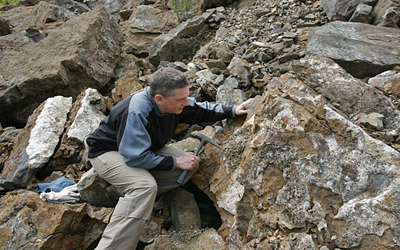Geology

₦50000
Geology: An Overview Geology is the scientific study of the Earth, its structure, materials, processes, and the forces that shape it. It involves understanding how the Earth's components—such as rocks, minerals, soil, and water—interact with each other over geological time scales. Geology combines aspects of physics, chemistry, biology, and environmental science, making it a multidisciplinary field that covers the Earth's history, structure, and processes. Geology has applications in various industries, including natural resource exploration (oil, gas, minerals), environmental protection, water resources management, and understanding natural hazards like earthquakes, volcanoes, and landslides. Course Outline for Geology 1. Introduction to Geology o Overview of Geology and Its Importance o History of Geological Studies o Branches of Geology: Physical Geology, Historical Geology, Environmental Geology, etc. o Role of Geologists in Society o Tools and Techniques in Geology 2. Earth Materials: Minerals and Rocks o Mineral Properties and Identification o Classification of Rocks: Igneous, Sedimentary, and Metamorphic Rocks o The Rock Cycle o Formation, Characteristics, and Uses of Rocks and Minerals o Laboratory: Rock and Mineral Identification 3. Geological Time and Earth History o Understanding Geological Time Scales o Fossils and Evolution of Life o Principles of Stratigraphy and Dating Techniques o Geochronology: Radiometric Dating Methods o Earth's History: Major Geological Eras, Periods, and Events 4. Plate Tectonics and Earth's Structure o Structure of the Earth: Crust, Mantle, Core o Plate Tectonics Theory: Continental Drift, Sea-Floor Spreading o Types of Plate Boundaries: Divergent, Convergent, and Transform o Earthquakes and Volcanism o Formation of Mountain Ranges and Ocean Basins o Laboratory: Plate Tectonics Models 5. Geomorphology: Study of Landforms o Weathering, Erosion, and Deposition Processes o River Systems and Fluvial Geomorphology o Glacial and Coastal Geomorphology o Deserts and Arid Landforms o Laboratory: Topographic Map Interpretation 6. Hydrogeology and Environmental Geology o Water Cycle and Groundwater Flow o Aquifers and Water Resources Management o Soil and Sediment Analysis o Environmental Geology: Pollution, Waste Management, and Remediation o Climate Change and Its Geological Impacts o Laboratory: Groundwater Flow Models 7. Economic Geology and Natural Resources o Mineral Exploration and Mining Techniques o Geology of Oil and Gas Reservoirs o Renewable and Non-Renewable Resources o Sustainable Resource Management o Laboratory: Resource Exploration Techniques 8. Geological Mapping and Field Studies o Methods of Geological Mapping o Interpreting Geological Maps and Cross-Sections o Field Techniques: Rock Sampling, Mapping, and Data Collection o Field Trips: Understanding Local Geology o Laboratory: Geological Map Interpretation 9. Geological Hazards and Risk Management o Understanding Earthquakes, Volcanic Eruptions, Landslides, and Tsunamis o Risk Assessment and Mitigation Strategies o Role of Geologists in Disaster Management o Laboratory: Earthquake Simulation Models 10. Geology Research and Applications o Geological Data Analysis and Interpretation o Applications of GIS and Remote Sensing in Geology o Research Methodologies in Geology o Capstone Project: Case Studies of Geological Phenomena o Presentation and Report Writing Skills ________________________________________ Expectations of Geology Students 1. Understanding Core Concepts: Students are expected to gain a deep understanding of geological processes, Earth's history, and the formation of rocks and minerals. This foundational knowledge is crucial for interpreting natural phenomena and solving geological problems. 2. Fieldwork and Practical Skills: Geology is a hands-on discipline, and students should be prepared for fieldwork, which may involve rock sampling, geological mapping, and studying various landforms in natural settings. Practical skills in using geological tools like rock hammers, GPS, and compasses are important. 3. Laboratory Proficiency: Students should be adept at conducting laboratory analyses, such as identifying minerals under microscopes, analyzing rock samples, and using models for understanding geological processes like groundwater flow or plate tectonics. 4. Research and Analytical Thinking: Students are expected to develop strong research skills, including the ability to analyze data, interpret geological maps, and conduct field-based research. Analytical thinking is essential for understanding complex geological phenomena. 5. Communication Skills: Effective communication of geological findings through reports, presentations, and technical diagrams is critical. Students should be able to clearly convey scientific information to both technical and non-technical audiences. 6. Environmental Awareness: With geology's strong connection to environmental issues, students should develop a keen awareness of how geological processes affect ecosystems, climate, and human activities. This includes understanding the implications of natural resource extraction and managing geological hazards.
Learn more
 0
0 